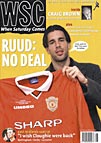 The worsening football violence in eastern Europe is out of sight and out of mind for the west, says Simon Evans. But not for long
The worsening football violence in eastern Europe is out of sight and out of mind for the west, says Simon Evans. But not for long
While possible violence at Euro 2000 occupies the minds and column inches of the west European media, the continent’s other half, as usual, is dealing with much more real and pressing problems. The second weekend of April saw serious crowd violence in St Petersburg, Budapest, Lodz and Bucharest. These were not western-style scuffles or skirmishes. Hooliganism in eastern Europe is proper stuff: rubber batons and tear gas, head-splitting and hospitalising. The most serious clashes were in St Petersburg, where one fan died during the latest in a series of full-scale riots that have greeted the start of the Russian season.
In Poland, an elite anti-terrorist squad was called in to quell violence at the match between Widzew Lodz and Legia Warsaw. It is the second time this season that the unit, designed to deal with armed criminals and the mafia, has been called on to deal with the hooligans who are increasingly plaguing the Polish game.
The Budapest derby between Ferencvaros and Ujpest has become a battleground in recent years, and this year’s match saw 50 fans injured and 12 arrested after fighting outside Ferencvaros’s Ulloi ut stadium. With 2,000 visiting Ujpest fans matched by an equal number of home supporters, the jaded phrase “mindless minority” hardly applies. At derby matches in the east the problem is rarely restricted to a minority.
Brutal, organised violence at football matches has been increasing ever since the collapse of communism, but while the governments and football authorities in the former eastern bloc have been crying out for help, little has come. The German and British police could offer some advice from their struggles against football violence. UEFA’s officials could use some of the organisations’ wealth to help improve stadium safety and security instead of just rolling their eyeballs when they turn up at grounds.
Very little of this is happening. It is not seen as our problem, and in a sense it is not. There will never be a major tournament in the east while the current economic divide in Europe and European football remains. Even Hungary’s joint bid with well-organised and reliable Austria to host Euro 2004 got little serious attention. Most of the region’s teams get knocked out of European club competitions before Roy Keane and Rivaldo have returned from their summer holidays.
Nor is there anything for the organisers of Euro 2000 to worry about. Of the four venues for violence in April, only Bucharest have representatives at the championship and those Dinamo fans who wrecked the away stand at Rapid can’t afford the train fare anyway. A teenage fan was killed at the Belgrade derby this year, but the Yugoslav national team is unlikely to be tarnished by the behaviour of its fans this summer either. At France 98, Yugoslav supporters consisted of émigrés and Belgrade businessmen. Poverty meant Partizan’s notorious “gravediggers” group stayed at home.
But violence in eastern Europe should be concerning UEFA and western football authorities. For a start, European football would be a damn sight more interesting if there were teams from the east who could once again challenge for honours in the way Red Star, Dinamo Kiev and Steaua Bucharest used to. More prosaically, if the west doesn’t come to eastern clubs, their hooligans will eventually come to the west.
Lack of capital is the biggest problem facing clubs in the east, but with the yobs literally in charge of the terraces, the clubs find it hard enough to keep hold of their fan base, let alone attract new supporters. In Hungary, TV images of a pensioner being punched in the face by a young fan of his own Ferencvaros team did more than just shock viewers. In the 12 months since that incident, the club’s attendances have halved.
“I used to follow Fradi regularly,” says Peter, a 26-year-old Budapest marketing executive. “Even when the football became basically crap I still went because it was where I had always gone with my dad on a Saturday afternoon. But when you hear and see what is going on at the games now, it is not something you want to deal with. It’s not worth it.”
Without the Peters of this world, east European clubs with huge potential, like Ferencvaros, are seeing their market shrink. Western advisors tell them to expand their merchandising and increase ticket prices, but there are fewer and fewer people who identify with the clubs. How many sponsors want to be associated with people who punch pensioners?
The problem for the west is that while the clubs are struggling financially, some parts of the east are getting wealthier. Hungary, Poland and the Czech Republic will soon enter the EU. The small band of VIPs who currently follow eastern teams in Europe may soon be supplemented by the less refined supporters who will be able to afford travel and won’t need a visa. Then the problem will land on UEFA’s doorstep. The television companies won’t be happy at spending millions on the rights to Champions League matches abandoned after anti-terrorist units are forced to intervene to stop skinheads attacking Ajax supporters.
UEFA won’t accept that. They will fine and ban clubs with troublemakers. The east European clubs will be out of sight again, with less money and less chance than ever of getting on level terms with the west. And European football will be even less diverse, less colourful and less interesting than it is now.
From WSC 160 June 2000. What was happening this month